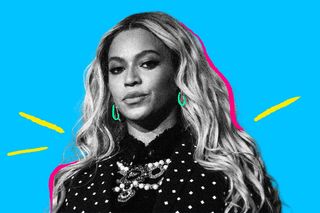
Beyoncé Removing a Lyric From Her New Song Makes Her Less Accountable to Critique
The trend of celebrities fixing their mistakes after being called out for it doesn’t lead to real accountability.

After disability activists criticized the use of an ableist slur in her new song, Beyoncé announced on Monday that she would replace the lyric. “The word, not used intentionally in a harmful way, will be replaced,” a statement from her team read. The word in question is a derogatory term for spastic diplegia that is widely condemned by the disability community.
However, others have noted how the term doesn’t originate from ‘spastic’ in the context in which it was used. Whereas the slur itself is used as an insult to denigrate someone’s behavior, gestures, or manner of speaking, some claim it has a different meaning in American English, or African American Vernacular English (AAVE): to fight, or to react. Earlier this year, Lizzo, too, was criticized for using it in one of her songs and had replaced it, prompting many to question the inherent ignorance of cultural context behind the criticism. However, this is still a contested claim.
The conversation, however, ended with Beyoncé agreeing to change the song lyric, just as Lizzo had. It prompts larger questions about celebrities course-correcting their behavior after being publicly called out. In instances where famous artists do or say something problematic, their response often doesn’t do much to further the conversation but instead, puts an end to it. An apology or a correction is more a public relations response than it is a meaningful engagement with criticism. Normalizing these almost templatized responses rather than demanding a conversation, only makes celebrities more immune — not less — to critique.
This has implications for what celebrities in turn can get away with. Over the weekend, Rolling Stone noted how amid the celebrity private-jet backlash, data suggests that Taylor Swift tops the list in the most number of trips taken on private jets this year. Swift, who is vocal about sustainability and the climate crisis, is an unlikely candidate to surpass Kylie Jenner in this regard. But her team released a statement that she wasn’t on most of the trips that the plane took. The issue speaks to our deeply one-sided relationship with celebrities, where statements rather than dialogue, pass for accountability — allowing their names to remain unblemished.
Related on The Swaddle:
How Celeb Fan Culture Minimizes Accountability
“Statements like ‘It wasn’t my intention to hurt anyone’ or ‘I wasn’t aware of the problematic nature’ of my views not only seem like a cop out (its 2021!) but they often shift onus to the oppressed,” noted The Quint. It also speaks to a larger phenomenon of pegging social justice issues to celebrities and their actions — turning what could have been bigger conversations and activism into carefully calibrated PR statements issued for the purpose of preventing an individual from getting a bad rep. Public call–outs, then, serve the purpose of calling attention to the problem — but many personalities seek to put a lid on it by merely saying the “correct” thing.
“The current cultural moment is one whose urgency feels particularly ill-suited to the sort of vapid pageantry that typically constitutes the “socially conscious” arm of a celebrity’s public-relations repertoire,” The New Yorker noted earlier. It may be that public apologies, by their very nature, are less sincere than private ones — they’re performative and are meant to be received by a wide audience in response to something the said audience has pointed out already. Researchers have noted how this explains why we simultaneously hate public apologies but also keep demanding them — putting us in an endless loop where the conversation stays stagnant.
Course corrections like these, moreover, are inherently beneficial to the celebrity rather than to the public: they ensure continued support and, in turn, continued engagement with the celebrity’s work. In this way, correcting their own record or apologizing invariably takes attention away from the offense itself, and makes a social justice issue about an individual. In this case, the conversation about disability, stigmatizing language, and harm is turned over into the hands of crisis managers, publicists, and PR teams — not the ideal place for any social issue to go.
The present incident, then, prompts the question of how to hold celebrities accountable without sacrificing nuance, accountability, or engagement with an issue. Should it stop at a singer-songwriter changing an offensive lyric, and is it a useful demand to be making? Arguably, such a demand allows celebrities to wipe the slate clean and could then prevent cultural change more than it fosters it.
Rohitha Naraharisetty is a Senior Associate Editor at The Swaddle. She writes about the intersection of gender, caste, social movements, and pop culture. She can be found on Instagram at @rohitha_97 or on Twitter at @romimacaronii.
Related


Woe Is Me! “I Feel Like the Only One Who Still Believes in Love. Am I Foolish?”
